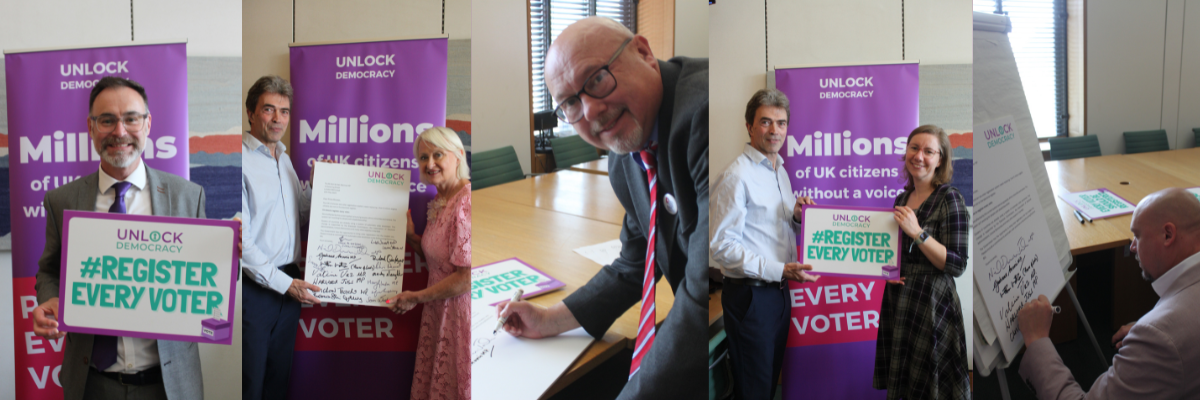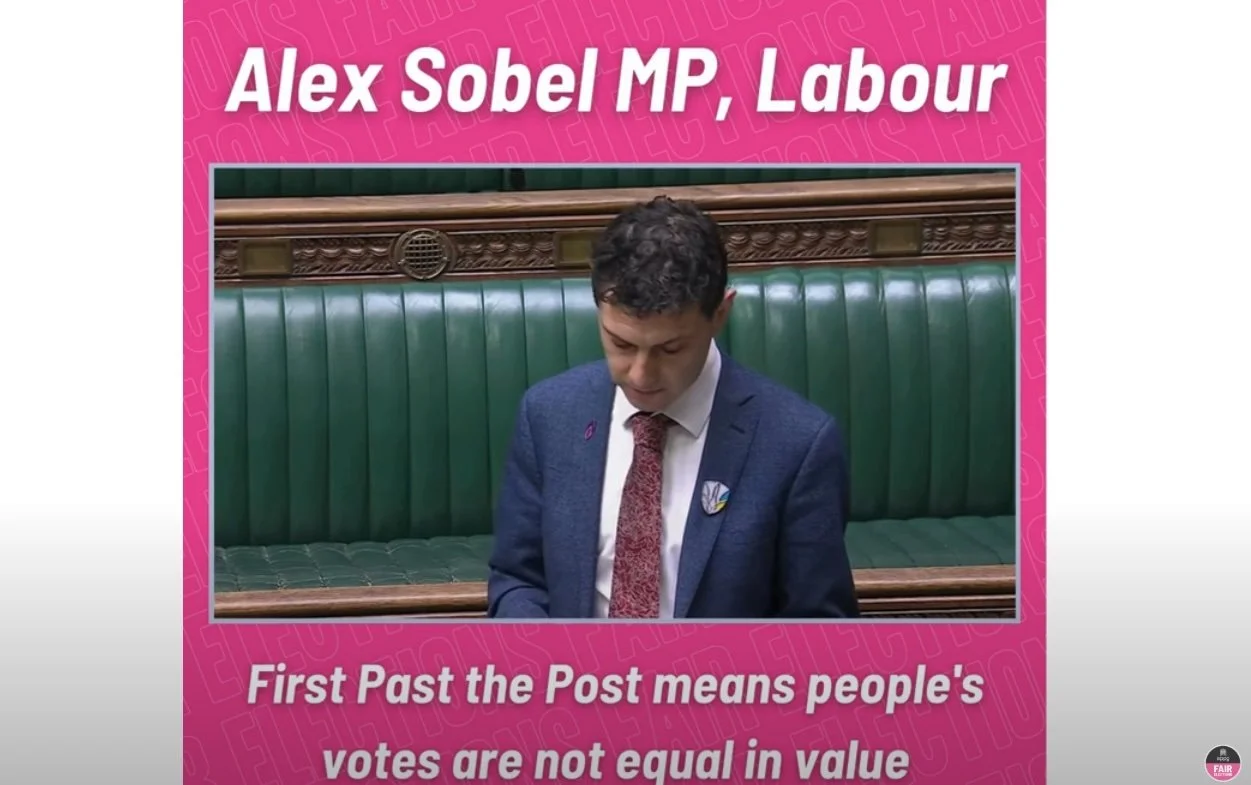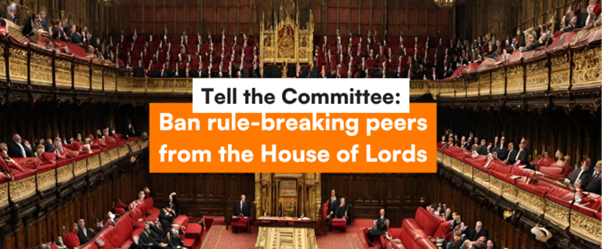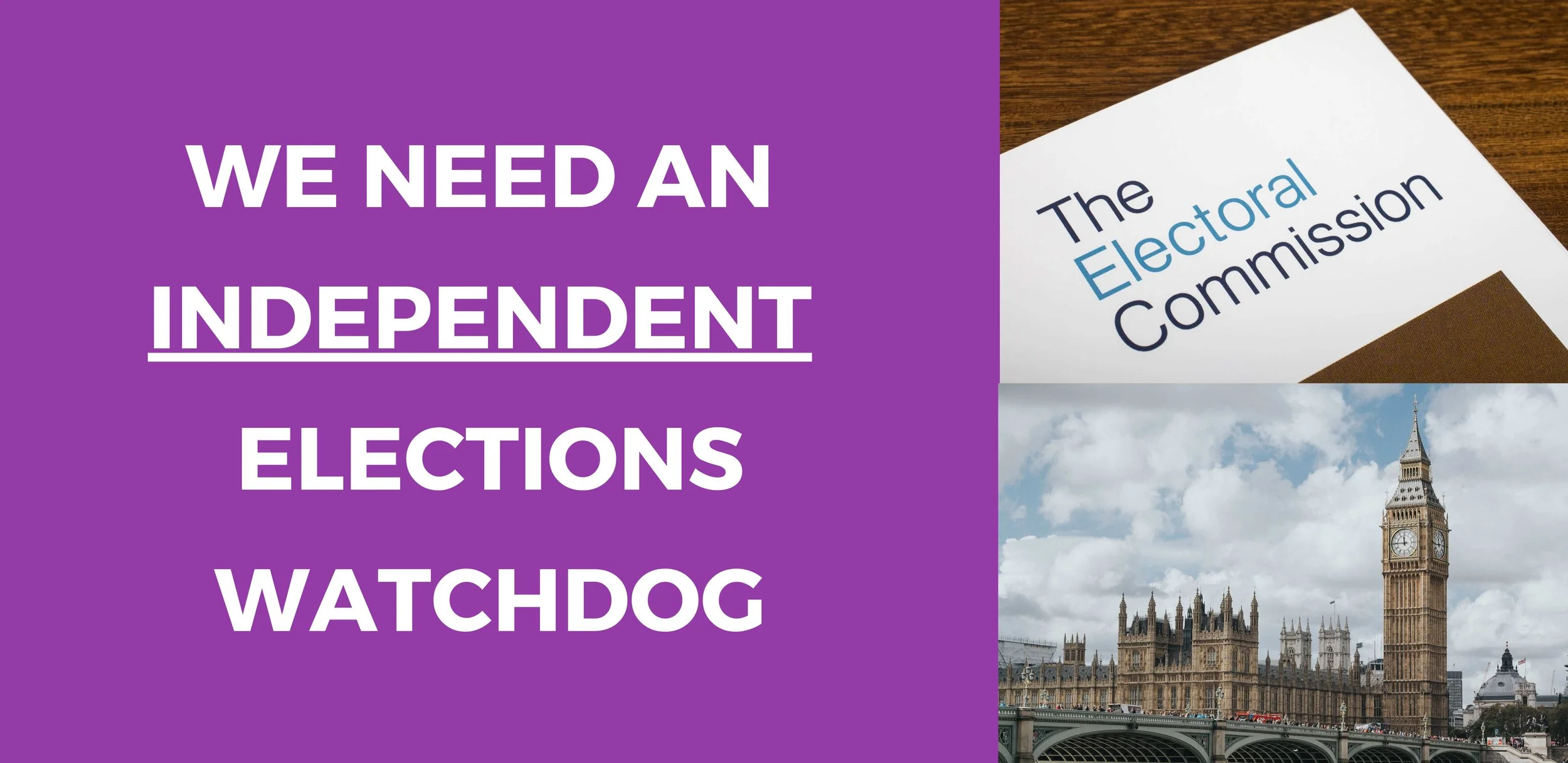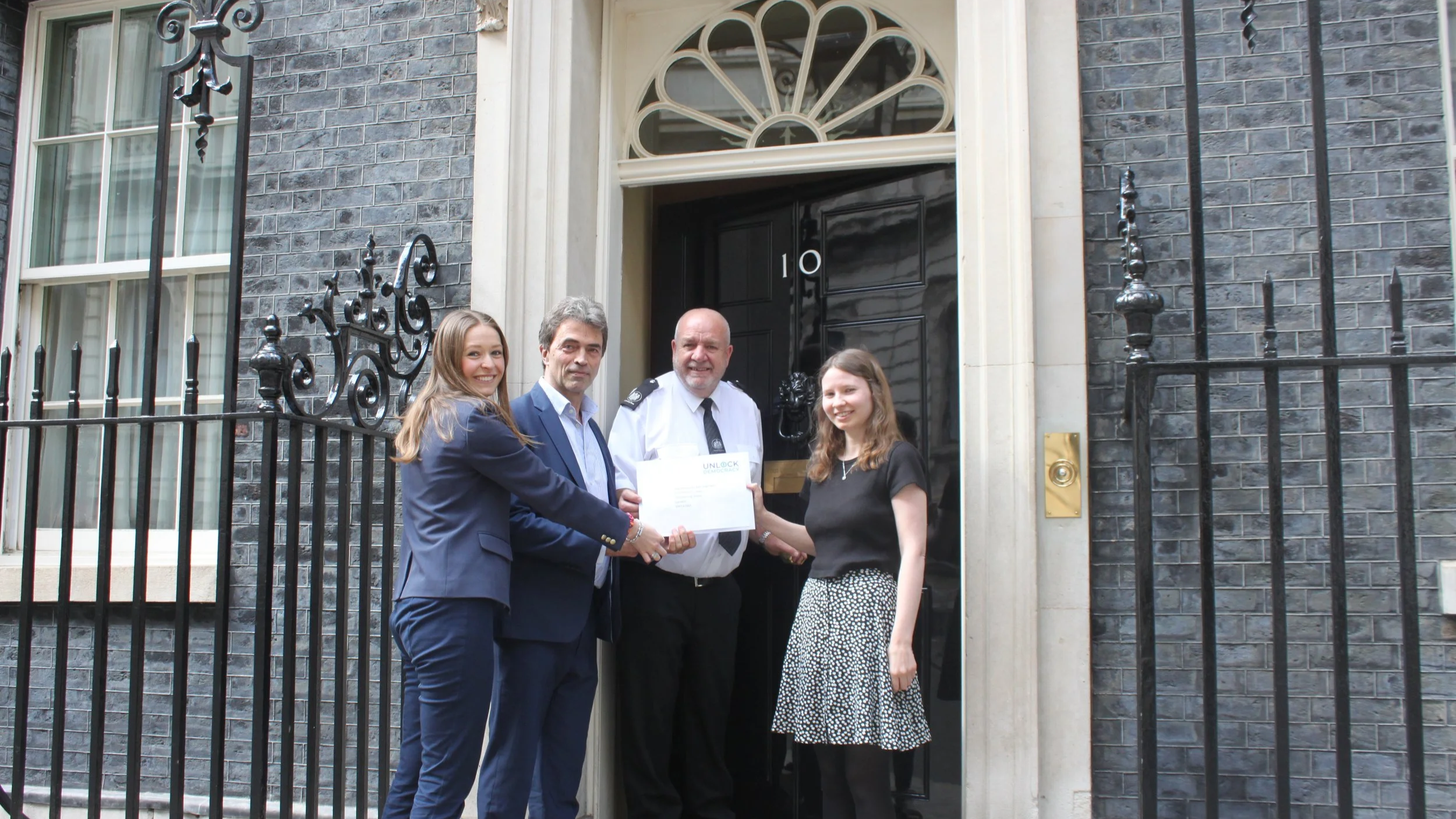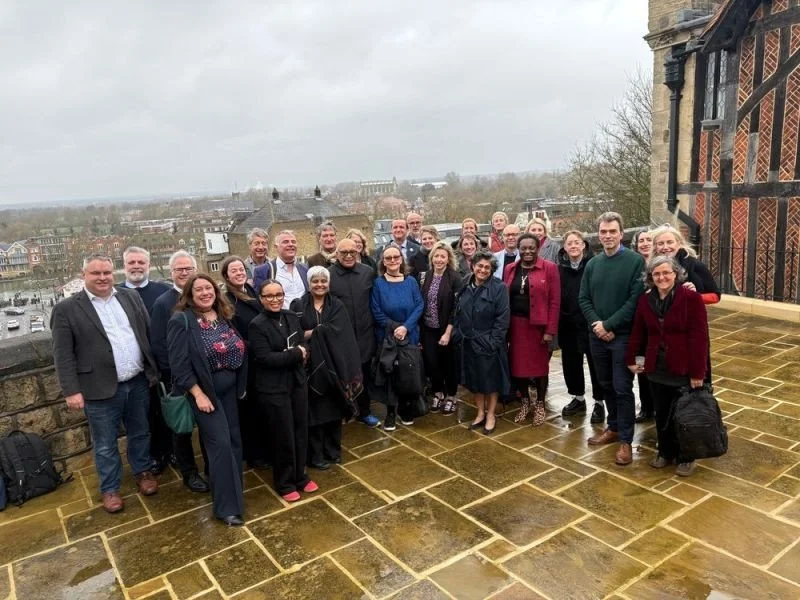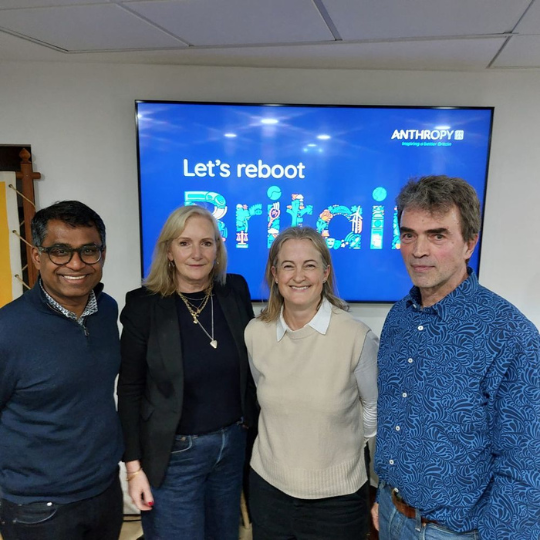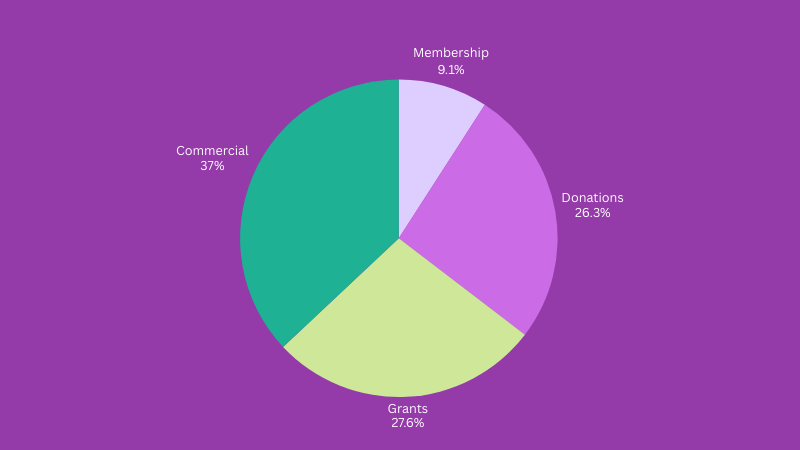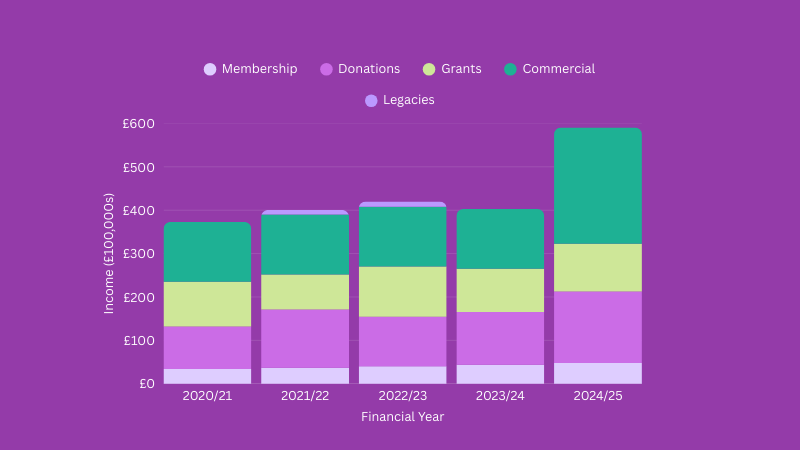Annual Report 2025
Message from the Chairs
This year has seen some important campaigning breakthroughs for Unlock Democracy. With a new government in office, we have seized the moment to push for lasting reforms to strengthen and safeguard our democracy. Thanks to the tireless efforts of our staff, members, and supporters, we are proud to celebrate some important wins.
Two highlights stand out. First, the Government’s Elections Strategy adopted two of our long-standing calls: lowering the voting age to 16 and moving towards Automatic Voter Registration. Second, for the first time, this Government admitted that First Past the Post is not fit for purpose for mayoral elections. This is a historic moment that opens the door for a conversation about electoral reform for Westminster. These wins are testament to years of patient campaigning, coalition-building, and the energy of our growing supporter base.
Our events calendar also reflected that energy. From expert panels on reform to a packed programme at party conferences, we’ve brought democratic renewal into the heart of public debate. A particular highlight was hosting the first Resilient Democracy Conference at St George’s House, where voices from politics, civil society, and business came together to confront the challenges our democracy faces and chart a shared path forward.
We’ve also continued to partner regularly with other organisations in this space. It was a privilege to stand side-by-side with our friends at the Electoral Reform Society, Make Votes Matter, Open Britain, Compass, 38 Degrees, and more in a range of campaigns this year.
None of this progress would be possible without the energy, determination, and creativity of our members and supporters. This year, we surpassed 90,000 supporters and have our sights on passing 100,000 soon. With around 3400 members, our membership base is also larger than ever.
By signing petitions, writing to their MPs, joining an event, or contributing to our research, our members and supporters have helped us put democratic reform firmly on the political agenda.
Together, we are proving that change is possible, and that our democracy can be made stronger, fairer, and more resilient. Thank you for being part of this journey.
Best wishes,
Jessica Metheringham and Luke Williams
Co-chairs, Unlock Democracy
Campaigns
This year, Unlock Democracy has committed to three campaigning areas:
Fix the System: Change the voting system, reform the House of Lords, and devolve more power out of Westminster
Safeguard democracy: Protect human rights, restore the right to protest, and implement a written constitution for the UK
Restore fairness: Clean up our politics, register every voter, scrap voter ID, and lower the voting age to 16.
Since September 2024, we have secured significant wins in the campaign to Restore Fairness to our elections. We have also seen positive progress in response to our calls to Fix the System. Read on to find out more.
Government commits to lowering the voting age to 16, and moving towards a system of Automatic Voter Registration
With a new government in place, we knew we had a crucial window of opportunity to influence them and get our policy asks in front of the right people. Just over one year since the General Election, and we’re proud to be able to celebrate some big wins.
First of all, the government’s Elections Strategy confirmed that 16 and 17-year-olds will get the vote, and that the voter registration system will be improved, with a move towards a system of Automatic Voter Registration. These are both long-overdue steps that will help to strengthen our democracy by bringing in new voices.
Automatic Voter Registration in particular has been a campaigning priority for Unlock Democracy in recent years. With the support of the UK Democracy Fund, we have been working hard behind the scenes to brief parliamentarians and bring them on board with what could be a transformative policy for participation in our elections. By working with academics and researchers, we were able to make an evidence-based case for change that caught the attention of dozens of parliamentarians who signed our open letter to the Prime Minister.
Government admits First Past The Post (FPTP) is not fit for purpose
It was also great to see the government’s proposal to scrap the use of FPTP for mayoral elections as part of its Devolution Bill, published in July. This is the first official admission by the government that FPTP is not fit for purpose in our multi-party politics.
This came after a year of campaigning hard for electoral reform alongside our allies in the sector. This took the form of convening the National Campaign for PR (NC4PR), which brings together a number of organisations united by a desire for a fairer voting system in Westminster elections. In May, we also launched a popular joint petition with Compass, Make Votes Matter, and Open Britain calling out the confusing, unfair, and unrepresentative results of the local elections.
Finally, when Proportional Representation (PR) was debated in parliament this year, our supporters rose to the challenge and helped us invite pro-PR MPs. The result was a debate in parliament in which we saw unprecedented support for PR from across the house, including the government benches.
Political donations rules to be tightened up
Some good progress has also been made in our campaign to clean up politics. The government has responded in part to our calls to tighten up the rules around political donations. Donations made via shell companies will now be outlawed, and Unincorporated Associations will be subject to tighter regulations.
This is a solid step forward, but we don’t think the proposed changes go nearly far enough. Most significantly, it does nothing to loosen the grip of the super-rich on our politics. Only a cap on political donations will stop wealthy donors having an oversized influence in our politics. That’s why we backed the Political Donations Bill, brought by Manuela Perteghella MP, which proposed such a cap. We shared our own research with MPs, to make sure they had all the facts going into the debate. Our supporters also helped us rally support for the Bill by asking their MPs to attend the debate and vote in favour of the Bill.
Where next for English Devolution?
The government is pressing ahead with plans to reform local government in England, despite barely consulting with local Councillors or local people. We agree that the current devolution settlement in England isn’t working, but this is not the right way to go about changing it.
We decided to ask Councillors ourselves what they thought about the changes. We found that a majority of Councillors in England who responded have strong concerns about the proposed reorganisation of local government in their area. We used these findings to publicly refute the government’s suggestion that their plans were popular with Councillors.
We have also been working closely with the District Councils’ Network to help push back against these top-down reforms and propose better solutions to the devolution puzzle in England.
House of Lords: A small win for democracy, but much more must be done
The Hereditary Peers Bill should soon become law. This means that, at long last, inherited power will not be guaranteed a place in our parliament.
We’ve been working hard this year to make sure that the government’s ambitions for reform don’t stop here, though. The Labour manifesto promised to start a public consultation on the future of the Second Chamber, and we have been taking every opportunity to remind them of that fact.
We have been helping with the investigative work of journalists at a number of national titles looking into the deeply embedded levels of sleaze and cronyism that pollute our parliament through the Lords. We also worked with 38 Degrees to promote a petition calling for Life Peers who commit serious breaches of Lords rules to be banned permanently from the House of Lords.
Other campaign updates
Our work calling for stricter limits on what work MPs can do in addition to their role as an MP also got a boost when the new government quickly established the Modernisation Committee in Parliament. The Committee is tasked with reforming House of Commons procedures, standards, and working practices.
We had expected the Committee to undertake a review of MPs Second Jobs. We were surprised when this was passed to the Standards Committee so we submitted evidence to their inquiry.
Another key promise of the new government was to set up a new Ethics & Integrity Commission, which would be independent and have powers to enforce a coherent and effective standards regime on MPs and Ministers. When no announcement on this matter was forthcoming after the General Election, we mobilised our supporters to write to the Prime Minister asking why. In July 2025, it was good to see plans for the new Commission made public at last, but extremely disappointing that the plans laid out are so weak.
A major omission from the government’s democracy plans is its failure to restore the independence of the Electoral Commission. This is a critical weakness in the health of our democracy, and continues to be an important focus of our campaigning work. We took the opportunity to stress the importance of an independent elections watchdog when we spoke with the Democracy Minister in the summer of 2025, and will be fighting for this to be added to the government’s Elections Strategy and any legislation that comes from it in 2025.
We have also continued our call on the government to scrap voter ID requirements at elections. There were some reforms to the voter ID rules in the government’s Elections Strategy, but even if implemented thousands will be blocked from voting at future elections. A complete scrapping of the ID requirement is the only way to restore fairness.
Our members and supporters
Unlock Democracy kept growing this year, with thousands of new supporters and hundreds of new members joining us.
Members and supporters have been at the forefront of work this year, signing petitions, writing to politicians, and sharing their views.
Together we have:
Sent over 25,238 emails to MPs, Peers, and local newspapers, encouraging them to stand up for democracy when it matters most.
Gathered nearly 300,000 signatures on petitions and letters to politicians, some of which we delivered by hand to Number 10 Downing Street.
Collected 61,000 responses to our surveys, which we’ve used to strengthen the evidence base of our campaigns.
Publications and Press
We’ve ramped up our publishing schedule in the last 12 months, with plenty of new reports, briefings, and comment pieces promoted. We also increased our press presence, working closely with a number of national publications to bring more democracy stories into the light.
Our work has been hitting the headlines throughout the year. Some highlights include helping news outlets like Tortoise Media (now The Observer), The Guardian, and Sky News with investigations into misconduct in the House of Lords.
Director, Tom Brake, is also a regular contact for journalists seeking comment on a range of democracy stories. He appears regularly on LBC and Times Radio and is frequently quoted in news titles across the political spectrum.
Unlock Democracy also kept up a regular output of written commentary with the launch of a new Substack, and a continuation of a regular column in Left Foot Forward.
The past 12 months also saw the publication of two important papers. First, the Democratic Integrity White Paper was published in the autumn of 2024 and featured in The Guardian. It presents a comprehensive set of recommendations that any government could implement immediately to make UK democracy fairer and more effective.
Hard copies of the White Paper were sent to MPs, and a launch event with Lord Paul Tyler and Caroline Slocock (former Private Secretary to 2 PMs) helped promote its ideas to a wider audience.
To mark the first anniversary of the 2024 General Election, we also published a Democracy Progress Report for the government’s first year in office. This work was covered in the Sunday Mirror, and is an effective tool for holding the government accountable to its pre-election promises.
Council
Unlock Democracy is governed by a Council, elected from the membership on a 2 year term. The current Council is about to enter its second year in office, and there have been no changes in the makeup of the Council in the past 12 months.
Thank you to Richard Wood, Sam Wheeler, Ian Driver, Lee Jasper, Chante O’Shaughnessy, David Schley, Catherine Bearder, Deborah Manzoori, Mary Southcott, Rebecca Warren, Luke Williams, Jessica Metheringham, Stephen Carter, Stephen Gosling, Stuart Hill, and Vicky Seddon for your unwavering support over the past 12 months. Our thanks also to Jane Reed on the Rodell Board.
The next elections for the Council take place in spring/summer 2026. If you’re interested in standing, or would like to know more, contact membership@unlockdemocracy.org.uk
Volunteers and work experience
Our work experience programme developed further this year, and we were able to offer work placements to a record number of students who were interested in careers in politics and campaigning.
This is a great way to engage with young people with democracy issues, and also to provide them with valuable experience that will help them in their future careers.
Events
It’s been another great year for events. We welcomed some big name commentators on our webinars, and hosted some engaging and interactive in-person events, too.
A high-point was hosting, alongside Compassion in Politics and Radix Big Tent, the Resilient Democracy Conference at St George’s House.
The Conference was sponsored by the Joseph Rowntree Reform Trust and brought together a wide range of think tanks, academics and other organisations and individuals, united by their interest in the vital need to strengthen democracy.
Together, attendees discussed the grave threats currently facing democracy, and created a concise, achievable ‘action plan’ to address these challenges. The plan consists of fivecore campaign streams, which were identified as pre-eminent in the shared aim to defend the 'central principles and institutions of democracy'.
It was also a great honour to speak at the Anthropy Conference at the Eden Project this year. Tom Brake from Unlock Democracy appeared alongside Danny Sriskandarajah (New Economics Foundation), Jennifer Nadel (Compassion in Politics), and Dr Hannah White (Institute for Government) in an event which challenged the audience to collaborate on ideas which could help fix our politics.
We also hosted a number of policy-focussed webinars and panel discussions like:
A review of the political landscape after the 2024 General Election, with Josiah Mortimer (Byline Times), and Lord Newby (former Lib Dem leader in the House of Lords)
A debate on alternatives to First Past the Post at the Mile End Institute
A discussion on the history and future of Lords reform with Dr Robert Saunders (Queen Mary, University of London)
A panel discussion on how First Past the Post can’t work in our multiparty system, with Professor Rob Ford, Polly MacKenzie, and Polly Toynbee
Celebrating black history month with a discussion on the importance of diversity in politics, featuring Amna Ahmad, Jovan Owusu-Nepaul, and Rita Patel
A detailed briefing on the government’s plans for English Devolution with Prof John Denham
A deep-dive into the British Social Attitudes Survey’s finding that more people than ever support changing the voting system with Professor Sir John Curtice
Finally, of course, we had a strong presence at the party conferences in 2024, holding events at the Green, Liberal Democrat, and Labour Party conferences.
Finance Summary
We are enormously grateful to everyone who has contributed financially to Unlock Democracy.
Your membership fees and donations amount to £212,813 for the year from April 2024 to March 2025, and are key to keeping us running as an independent voice for democracy.
Unlock Democracy is also supported by income from our subsidiary property company, Rodell Properties. Rodell owns and manages two properties in Central London.
Trusts and Individual Donors
We are very grateful to the trusts and grant funders who provide support for specific projects. We’d particularly like to thank the Joseph Rowntree Reform Trust for their generous support for our work.
Full Financial Report
The full, audited accounts for Unlock Democracy’s financial year 2023-2024 will be available in November 2025, in an independent report by our auditors.

